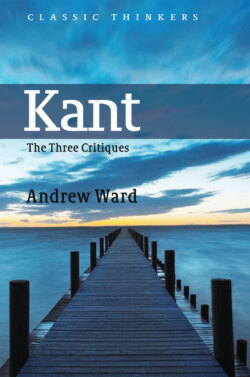Читать книгу Kant - Andrew Ward - Страница 26
Two Problems about Kant’s Account of Space and Time
ОглавлениеThe first problem is this.Allowing that space and time are pure a priori intuitions, why should they not also attach, absolutely or relationally, to things in themselves? Admittedly, if they do, our mathematical judgments could not be known with a priori certainty to apply to them; but this is scarcely enough to show that a (possibly) differently structured absolute or relational space and time could not also exist. Yet Kant clearly holds that space and time belong only to the forms of intuition, and that they cannot be things in themselves or relations between things in themselves. (Indeed, if they were, this would have serious repercussions for his moral philosophy.) I believe that he would seek to justify his position along the following lines. Since it has been shown that space and time are pure intuitions, they are not the type of phenomena that can exist as things in themselves or as relations between such entities. A pure intuition is an intrinsic property or mode of the mind, and hence cannot exist in its own right (just as a pain cannot exist in its own right, but must exist as a mode of a substance). It makes no sense to suppose that what is an intrinsic property of the mind can exist on its own. A thing in itself, on the other hand, is essentially something that can exist in its own right. Equally, it makes no sense to hold that what is an intrinsic property of the mind can be a relation holding between things in themselves.
The second problem concerns Kant’s claim that we can know with a priori certainty the structure of space and time (by means of mathematical demonstrations). Applying the point specifically to geometry, the objection is that even if we grant that geometrical demonstrations, presently carried out, can tell us now about how space must be structured, how do we know that these demonstrations will do so in the future? Perhaps the structure of space will change overnight, so that any knowledge that I now have about the structure of space will not be applicable to my experience tomorrow. His response to this does not emerge until the following chapter, the Transcendental Analytic, where the conditions necessary for the subject’s consciousness of its own existence through time are discussed. Kant will argue that a subject can have this consciousness of himself only provided that he can be conscious of all the outer objects of his senses existing in one space. However, if the rules governing the structure of space, and so spatial objects, are capable of changing between times, this would be impossible. It would, Kant argues, be impossible for the same I to be conscious of the unity of space. Accordingly, I (the same subject) cannot be conscious of a space which, at different times, is governed by differing sets of synthetic a priori rules. (A modified version of this reply can be employed against the objection that even if I do have a priori knowledge of the structure of this part of space, why might it not have happened that if I (the same subject) had now been conscious of another part of space, I should have discovered a different set of rules applying to that region of space.)
It is, incidentally, the requirement that without the recognition of one space, there could be no consciousness of oneself as the same subject through time, that explains, for Kant, why we each think of space as essentially one (as he held in Argument 3 of the Metaphysical Exposition of space).
